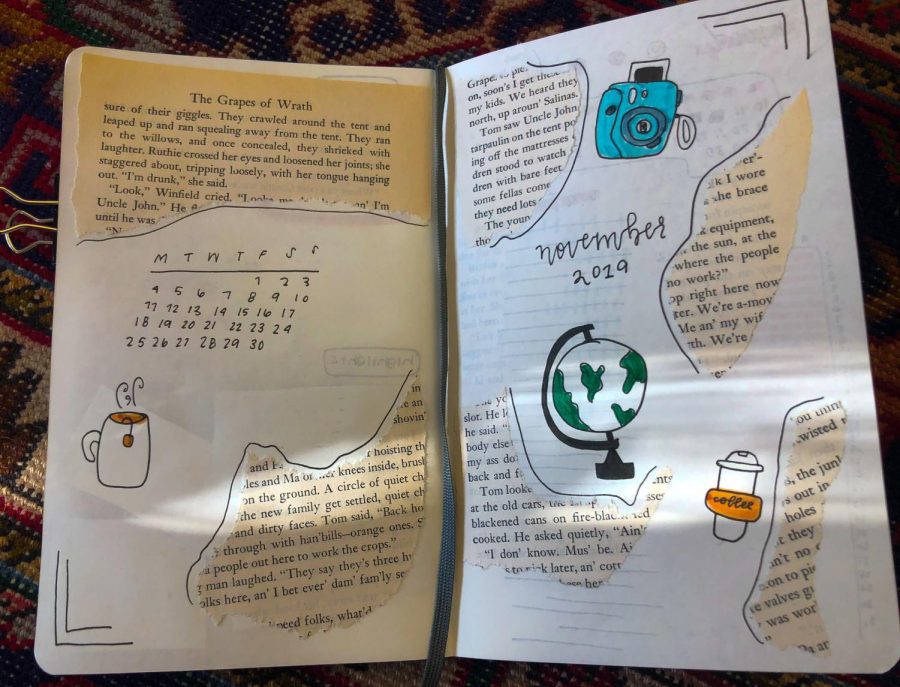Journaling Club revitalizes reflection
With the rising popularity of journaling among students, Journaling Club aims to create a space for them to further explore how written reflection can evoke self-awareness.
Freshman Rosemary Porto has taken up the hobby of bullet journaling in her free time Nov. 13. Filled with holiday countdowns, mood trackers and little doodles, it helps express creativity. photo by Becca Speier
November 26, 2019
Junior Georgia Winfield sits down at the beginning of June to sketch exactly 30 hexagons of honeycomb in a graph ruled journal. She then colors each honeycomb with a distinct combination of nine various shades every day, each corresponding to a different mood of hers. When she finally sets down her marker on the last day of the month, she can analyze her journal in full: the exact percentage of the days in June she felt happy, sad, angry, annoyed, productive, lazy, exhausted, stressed or content.
“Journaling definitely helps keep me on track,” Winfield said. “It helps you to figure out what is causing change. For me, it’s helpful to reflect on that and be able to look back and realize what correlations there are in my life.”
Winfield journals every day, using her notebook to record her thoughts and track her feelings. It was her passion for journaling, along with the growing popularity of the activity among students, that inspired her to create a school space for those who journaled to meet. Last February, she suggested the idea of a journaling club to junior Abby Farmer, whose own journaling inspired Winfield to pick it up.
“I’d see people talk about their bullet journals, like, ‘Oh my gosh, you did this spread,’” Farmer said. “We wanted to share our ideas about it with other people. We were kind of thinking of a little book club, for journaling.”
After enlisting the help of English teacher Kelly Finn as their moderator, Farmer and Winfield started a Journaling Club Instagram page over the summer, and began posting pictures of their own journals to promote the activity. When sophomore Lucy Wade came across the Instagram page, she followed it to help guide her own journaling, and she ultimately decided to enroll at the club fair.
Now that Wade is a part of Journaling Club, she is able to explore more writing styles and keep up with the hobby more frequently.
“I didn’t really know what to do, but then I joined Journaling Club and they gave us ideas, so now I do it,” Wade said. “At the beginning of the month, I look on Pinterest or the Journaling Club — on their Instagram, they always have stuff.”
Wade gravitates toward bullet journaling, which for her, involves both what she accomplished during the day and assignments she needs to complete, with reflections every couple days. Journaling styles among students in the club differ and both Farmer and Winfield hope to show a wide variety of journaling in the club. They believe there is something for everyone.
“You can’t really mess up, it’s just whatever works for you,” Farmer said. “Don’t try to do what other people tell you to do. For me, doing a habit tracker every day was too much.”
Farmer and Winfield switch off meetings to lead because they have diverse strengths when it comes to journaling. While Winfield led the bullet journaling meeting, Farmer led the diary journaling meeting. Farmer calls her journal a “catch all,” a place to carry her art, gratitude and thoughts.
“It’s a creative outlet so that helps me just de stress a little bit,” Farmer said. “[Winfield] does trackers and it’s more organized and mine’s just more like random and freeform. It helps me reflect on my day and feel a sense of closure from what I did that day.”
Although their styles of journaling differ, both Winfield and Farmer agree that through the emphasis on expression, journaling is beneficial for self-awareness. According to The University of Rochester Medical Center, journaling can help you reduce stress, manage anxiety and cope with depression. Winfield and Farmer recommend self-care and gratitude journaling, which was the topic of their October club meeting, to become more conscious of mental health. This type of journaling involves listing facets of your life that you are grateful for and recording how you are feeling emotionally.
“If I’m having a rough time, I do a lot more gratitude journaling, which makes me think school is hard, life is hard right now, but there are so many things to be thankful for,” Winfield said. “I’ll look back on those things and be like, not everything is bad right now, there are things I should be thankful for.”
Farmer hopes in the future that they can make the club more engaging. The club’s leaders present a new type of journaling during the first activity period of each meeting, then let the members try it out and share.
“I want it to become a close-knit thing where we all share everything we’re doing, and it’s less Georgia and I leading it and more people sharing with each other,” Farmer said. “I think that would be a goal for us, getting people to really participate with social media.”
Although the different journaling styles are new to many of the members when they join the club, one challenge Winfield sees for the future is ensuring that the club keeps offering members new ways of journaling. Farmer and Winfield both want journaling to help students continually find ways to express themselves.
“It’s just important to sit down and think, you know, I don’t want to just be doing this to say I journal,” Winfield said. “How is this going to help me in my life?”




